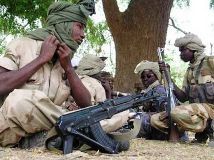Chad, CAR use Darfur for deflect criticism of internal problems
By Jordan Davis
Nov 17, 2006 (DAKAR) — United Nations Secretary-General Kofi Annan says Sudan has agreed in principle to allow a joint United Nations and African Union peacekeeping force in Darfur. Many have warned violence in Darfur is spilling over into neighboring countries and could destabilize the entire region.
 Negotiations to bring peacekeepers into Sudan’s Darfur region have taken on greater urgency in recent weeks, as reports increase that the violence in Darfur is now spilling over into neighboring Chad and the Central African Republic.
Negotiations to bring peacekeepers into Sudan’s Darfur region have taken on greater urgency in recent weeks, as reports increase that the violence in Darfur is now spilling over into neighboring Chad and the Central African Republic.
Over the weekend, humanitarian groups say, Arab-affiliated militias killed hundreds in eastern Chad in raids similar to those seen in Darfur between the Janjaweed militias and ethnic black African groups.
Since the beginning of the month an estimated 20 villages in eastern Chad have been attacked.
Richard Barltrop, an Africa expert with London-based Oxford Analytica, said “Evidence of fighting ebbing and flowing across the border areas and civilians being displaced back and forth across the border areas, that’s a manifestation, that’s an example of fighting spilling over.”
Chadian officials in the capital N’Djamena have also tried to link the country’s rebel movement to Arab militias in Darfur.
Last April rebels nearly seized control of the capital, and in the last several months they have mounted a new offensive.
Chadian officials say Sudan is backing the rebel groups.
They have also pledged to send troops to help the Central African Republic, a country that also says Sudan is backing rebels operating in its country.
But Barltrop says it is all too easy to blame everything on Sudan.
“They’re jumping on the bandwagon. The only substance to Sudanese support is that to some extent some of the rebel groups shelter or have sheltered in Darfur,” he said.
“When fighting targets government infrastructure in Chad and in Central African, when rebel groups capture government targets and try to move towards the capital that is domestically driven fighting,” he continued.
In Chad, many of the rebel leaders are former government officials, and former supporters of President Idriss Deby who fell out of favor with his government.
In Central African Republic, the insurgents are former supporters of Ange-Felix Patasse, who was ousted in a coup by current president Francois Bozize.
For Roland Marchal, a professor at the Paris-based Institute for Political Science, insecurity the Central African Republic and Chad has nothing to do with Sudan.
He says the leaders of both Chad and the Central African Republic are far more to blame than Sudan for their problems. He says both governments should be more transparent and democratic.
“In my understanding of the situation there should be dramatic political changes in the two countries,” he said.
Analyst Adrien Feniou, with London-based Global Insight, says officials in N’Djamena have been able to use talk of a spillover of violence from Darfur to deflect international criticism of their regime.
“For Chad, blaming the Sudanese government is an effective PR stunt for getting the international community more involved,” he said.
“The Americans have been extremely intent on sending U.N. troops into Darfur. And President Deby has also wanted to see peacekeeping troops in Chad. He believes that would stabilize his regime and discredit the rebellion,” he continued.
The United Nations security council voted in August to send peacekeepers to shore up Sudan’s border with the Central African Republic and Chad.
Up to now, that resolution still has not been put into effect.
(VOA)
